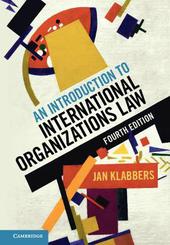
|
An Introduction to International Organizations Law
Hardback
Main Details
| Title |
An Introduction to International Organizations Law
|
| Authors and Contributors |
By (author) Jan Klabbers
|
| Physical Properties |
| Format:Hardback | | Pages:422 | | Dimensions(mm): Height 250,Width 176 |
|
| ISBN/Barcode |
9781108842204
|
| Classifications | Dewey:341.2 |
|---|
| Audience | | Tertiary Education (US: College) | |
|---|
| Edition |
4th Revised edition
|
| Illustrations |
Worked examples or Exercises
|
|
Publishing Details |
| Publisher |
Cambridge University Press
|
| Imprint |
Cambridge University Press
|
| Publication Date |
10 March 2022 |
| Publication Country |
United Kingdom
|
Description
The fourth edition of this market-leading textbook offers students a clear framework for understanding the practice and logic of International Organizations Law. It is structured around the three defining relationships IOs engage in - namely, with their member states, with their organs and staff, and with the outside world. These different dynamics give rise to different concerns, which each help to explain the logic behind international institutional law. The text also discusses the essential topics of the law of IOs, including powers and finances, privileges and immunities, institutional structures, and accountability. By demonstrating how the theory works in practice, with recent examples, students will observe the impact and significance of International Organizations Law. Updated with the latest case law and literature, this new edition also contains discussions of the withdrawal of Israel and the US from UNESCO, Brexit, and the Covid-19 pandemic, and how these affect the law of international organizations.
Author Biography
Jan Klabbers has been teaching international law and the law of international organizations for more than two decades, and is currently Professor of International Law at the University of Helsinki. He has held visiting positions at, amongst others, New York University Law School; the Graduate Institute of International and Development Studies, Geneva; and the University of Paris. He has received several teaching awards, and the first three editions of this book have met with general acclaim.
Reviews'Among the available textbooks on international organizations law, this book continues to stand out as the most conceptual one. Legal questions on the functioning of international organizations are answered in the context of a comparison of institutional rules. This approach is crucial to a better understanding of the nature of international organizations and their increasing importance in global rule-making.' Professor Ramses A. Wessel, University of Groningen 'There is no better interpreter of the legal world of international organizations than Jan Klabbers. This new edition brings his classic text up to the minute while maintaining its sweeping overview of IOs in global history. It shows how Brexit, Covid, and other recent developments are entangled with the timeless questions about the authority, practice, and limits of international institutions. He navigates neatly among the nuance of legal theory, the apparent solidity of black-letter law, and the fluidity of practice. Even the footnotes are interesting. This is an essential book for scholars and students of international law and politics.' Professor Ian Hurd, Northwestern University 'A very welcome update of a classic textbook. Students of the law of international organizations will find a clear exposition and analysis of all key areas. Moreover, the tension between organizational autonomy and state sovereignty provides a powerful narrative which, when combined with the author's engaging style, makes the book much more than a teaching text.' Professor Nigel D. White, University of Nottingham 'The book brings together a wealth of illuminating illustrations drawn directly from the real world. The selection of these case studies is motivated not just by how helpful they are in clarifying the rules, but also by how well they show the rules' societal significance, and by their "entertainment" value - i.e. their potential first to captivate and then to keep the reader's interest in the materials.' Dr Otto Spijkers, Utrecht University School of Law
|